Organisational Behaviour Analysis: BBC Case Study Report
VerifiedAdded on 2020/10/22
|19
|6264
|414
Report
AI Summary
This report provides a comprehensive analysis of organisational behaviour within the British Broadcasting Corporation (BBC). It delves into the influence of organisational culture, including Handy's typology, power dynamics, and political aspects on employee behaviour and team performance. The report examines various motivation theories, such as Maslow's hierarchy and Vroom's expectancy theory, and evaluates their impact on employee motivation levels. Furthermore, it explores different types of teams within the BBC and the importance of effective team structures. The analysis includes an assessment of barriers to effective performance and proposes strategies for improving team productivity and overall organisational success. The report utilizes a case study approach to provide practical insights into managing employee behaviour, fostering a positive work environment, and achieving organisational goals within the BBC.
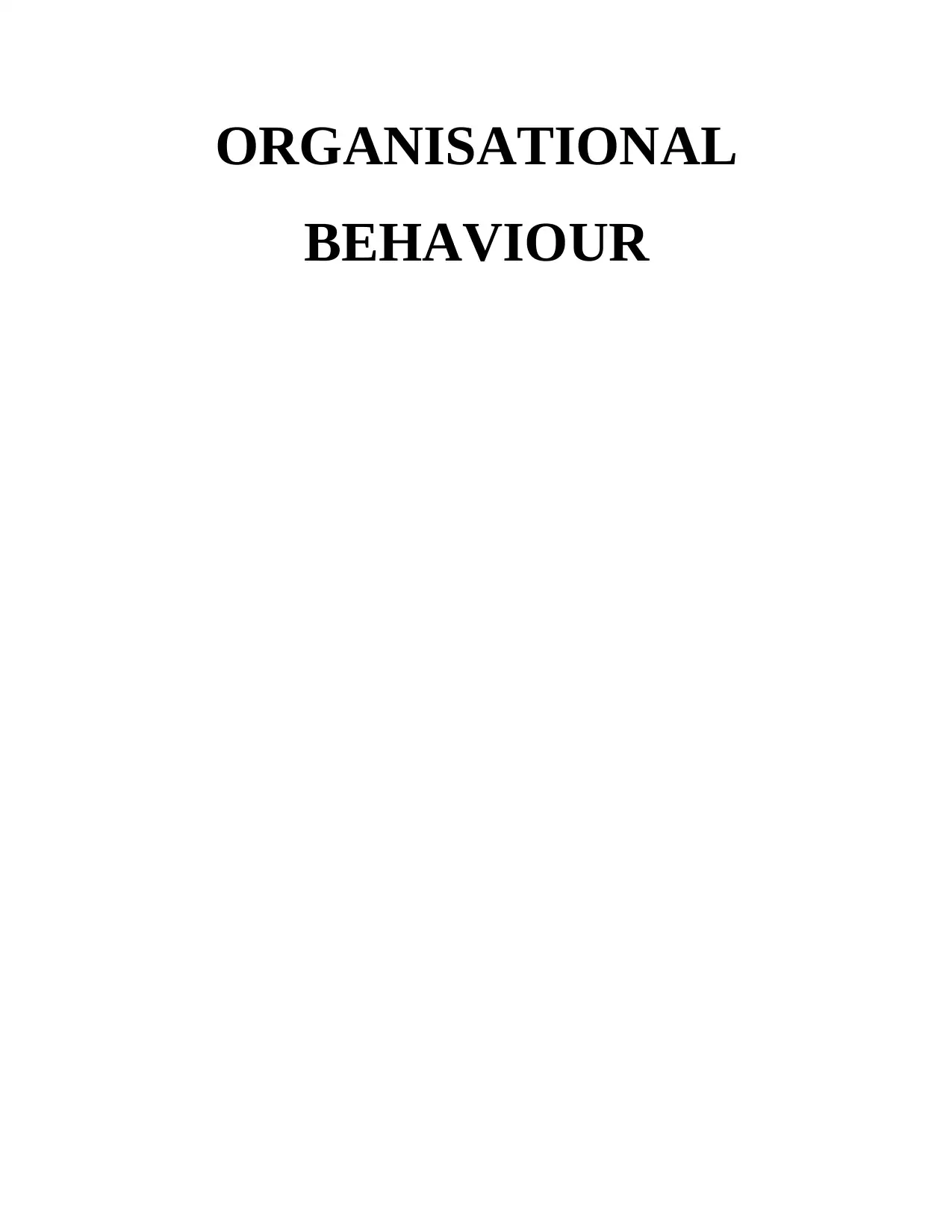
ORGANISATIONAL
BEHAVIOUR
BEHAVIOUR
Paraphrase This Document
Need a fresh take? Get an instant paraphrase of this document with our AI Paraphraser
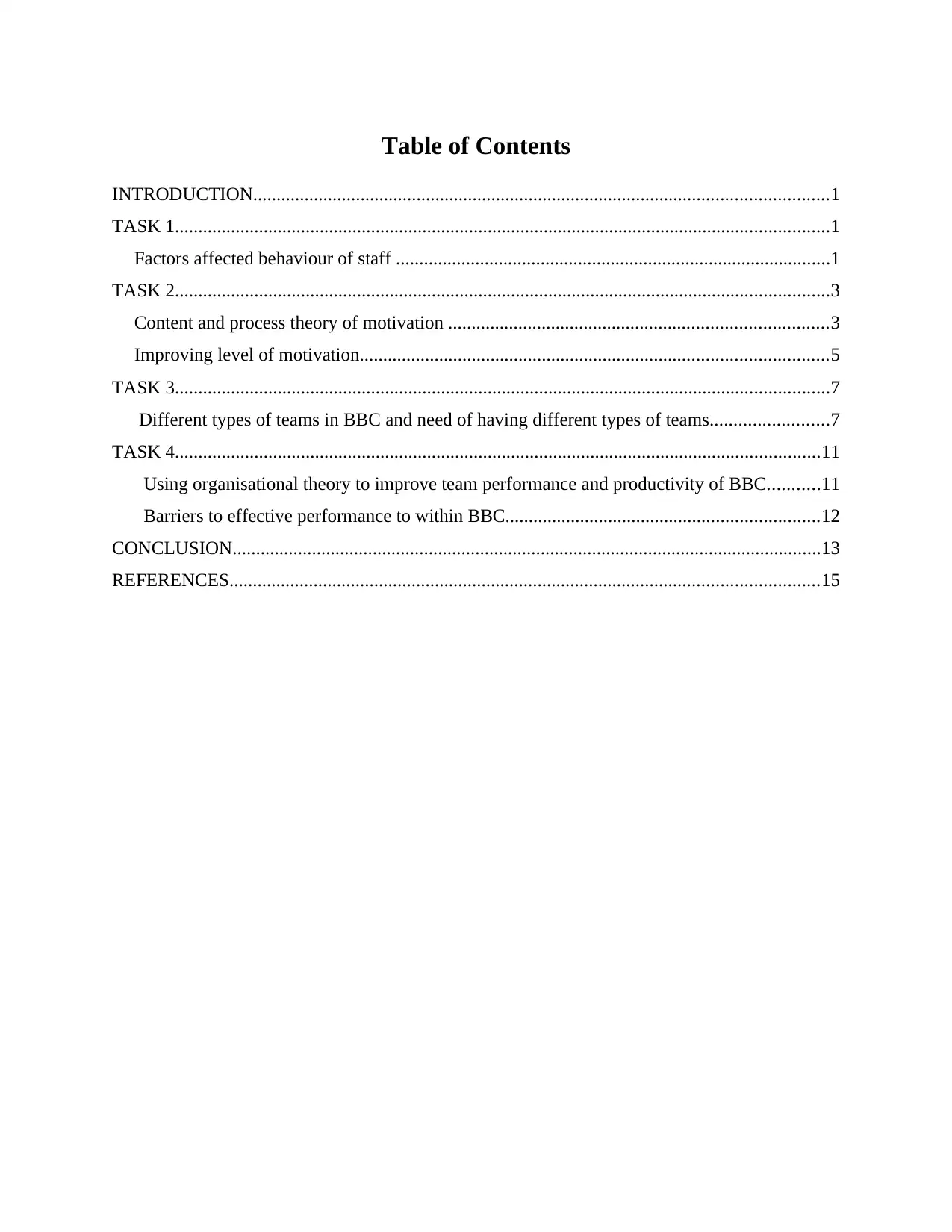
Table of Contents
INTRODUCTION...........................................................................................................................1
TASK 1............................................................................................................................................1
Factors affected behaviour of staff .............................................................................................1
TASK 2............................................................................................................................................3
Content and process theory of motivation .................................................................................3
Improving level of motivation....................................................................................................5
TASK 3............................................................................................................................................7
Different types of teams in BBC and need of having different types of teams.........................7
TASK 4..........................................................................................................................................11
Using organisational theory to improve team performance and productivity of BBC...........11
Barriers to effective performance to within BBC...................................................................12
CONCLUSION..............................................................................................................................13
REFERENCES..............................................................................................................................15
INTRODUCTION...........................................................................................................................1
TASK 1............................................................................................................................................1
Factors affected behaviour of staff .............................................................................................1
TASK 2............................................................................................................................................3
Content and process theory of motivation .................................................................................3
Improving level of motivation....................................................................................................5
TASK 3............................................................................................................................................7
Different types of teams in BBC and need of having different types of teams.........................7
TASK 4..........................................................................................................................................11
Using organisational theory to improve team performance and productivity of BBC...........11
Barriers to effective performance to within BBC...................................................................12
CONCLUSION..............................................................................................................................13
REFERENCES..............................................................................................................................15
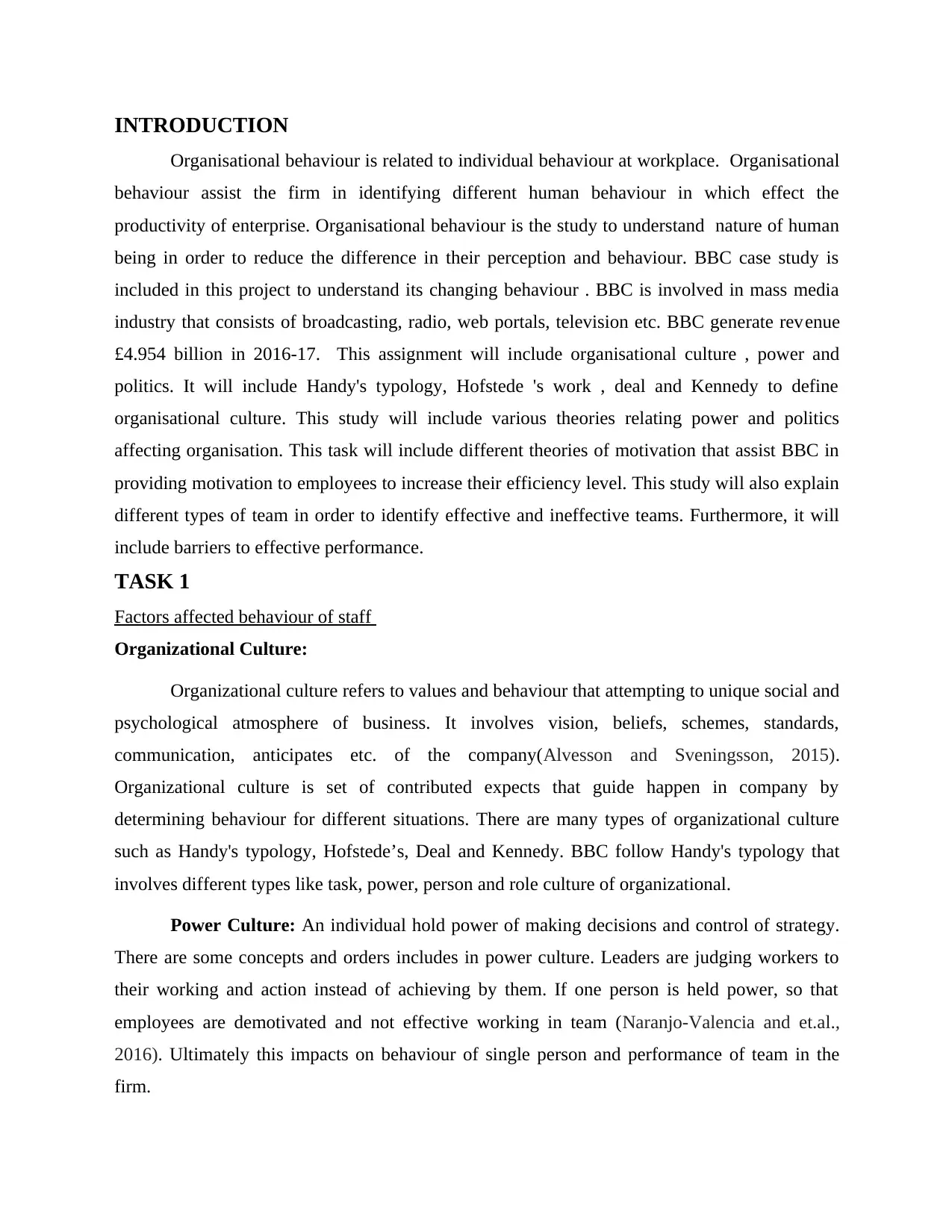
INTRODUCTION
Organisational behaviour is related to individual behaviour at workplace. Organisational
behaviour assist the firm in identifying different human behaviour in which effect the
productivity of enterprise. Organisational behaviour is the study to understand nature of human
being in order to reduce the difference in their perception and behaviour. BBC case study is
included in this project to understand its changing behaviour . BBC is involved in mass media
industry that consists of broadcasting, radio, web portals, television etc. BBC generate revenue
£4.954 billion in 2016-17. This assignment will include organisational culture , power and
politics. It will include Handy's typology, Hofstede 's work , deal and Kennedy to define
organisational culture. This study will include various theories relating power and politics
affecting organisation. This task will include different theories of motivation that assist BBC in
providing motivation to employees to increase their efficiency level. This study will also explain
different types of team in order to identify effective and ineffective teams. Furthermore, it will
include barriers to effective performance.
TASK 1
Factors affected behaviour of staff
Organizational Culture:
Organizational culture refers to values and behaviour that attempting to unique social and
psychological atmosphere of business. It involves vision, beliefs, schemes, standards,
communication, anticipates etc. of the company(Alvesson and Sveningsson, 2015).
Organizational culture is set of contributed expects that guide happen in company by
determining behaviour for different situations. There are many types of organizational culture
such as Handy's typology, Hofstede’s, Deal and Kennedy. BBC follow Handy's typology that
involves different types like task, power, person and role culture of organizational.
Power Culture: An individual hold power of making decisions and control of strategy.
There are some concepts and orders includes in power culture. Leaders are judging workers to
their working and action instead of achieving by them. If one person is held power, so that
employees are demotivated and not effective working in team (Naranjo-Valencia and et.al.,
2016). Ultimately this impacts on behaviour of single person and performance of team in the
firm.
Organisational behaviour is related to individual behaviour at workplace. Organisational
behaviour assist the firm in identifying different human behaviour in which effect the
productivity of enterprise. Organisational behaviour is the study to understand nature of human
being in order to reduce the difference in their perception and behaviour. BBC case study is
included in this project to understand its changing behaviour . BBC is involved in mass media
industry that consists of broadcasting, radio, web portals, television etc. BBC generate revenue
£4.954 billion in 2016-17. This assignment will include organisational culture , power and
politics. It will include Handy's typology, Hofstede 's work , deal and Kennedy to define
organisational culture. This study will include various theories relating power and politics
affecting organisation. This task will include different theories of motivation that assist BBC in
providing motivation to employees to increase their efficiency level. This study will also explain
different types of team in order to identify effective and ineffective teams. Furthermore, it will
include barriers to effective performance.
TASK 1
Factors affected behaviour of staff
Organizational Culture:
Organizational culture refers to values and behaviour that attempting to unique social and
psychological atmosphere of business. It involves vision, beliefs, schemes, standards,
communication, anticipates etc. of the company(Alvesson and Sveningsson, 2015).
Organizational culture is set of contributed expects that guide happen in company by
determining behaviour for different situations. There are many types of organizational culture
such as Handy's typology, Hofstede’s, Deal and Kennedy. BBC follow Handy's typology that
involves different types like task, power, person and role culture of organizational.
Power Culture: An individual hold power of making decisions and control of strategy.
There are some concepts and orders includes in power culture. Leaders are judging workers to
their working and action instead of achieving by them. If one person is held power, so that
employees are demotivated and not effective working in team (Naranjo-Valencia and et.al.,
2016). Ultimately this impacts on behaviour of single person and performance of team in the
firm.
⊘ This is a preview!⊘
Do you want full access?
Subscribe today to unlock all pages.

Trusted by 1+ million students worldwide
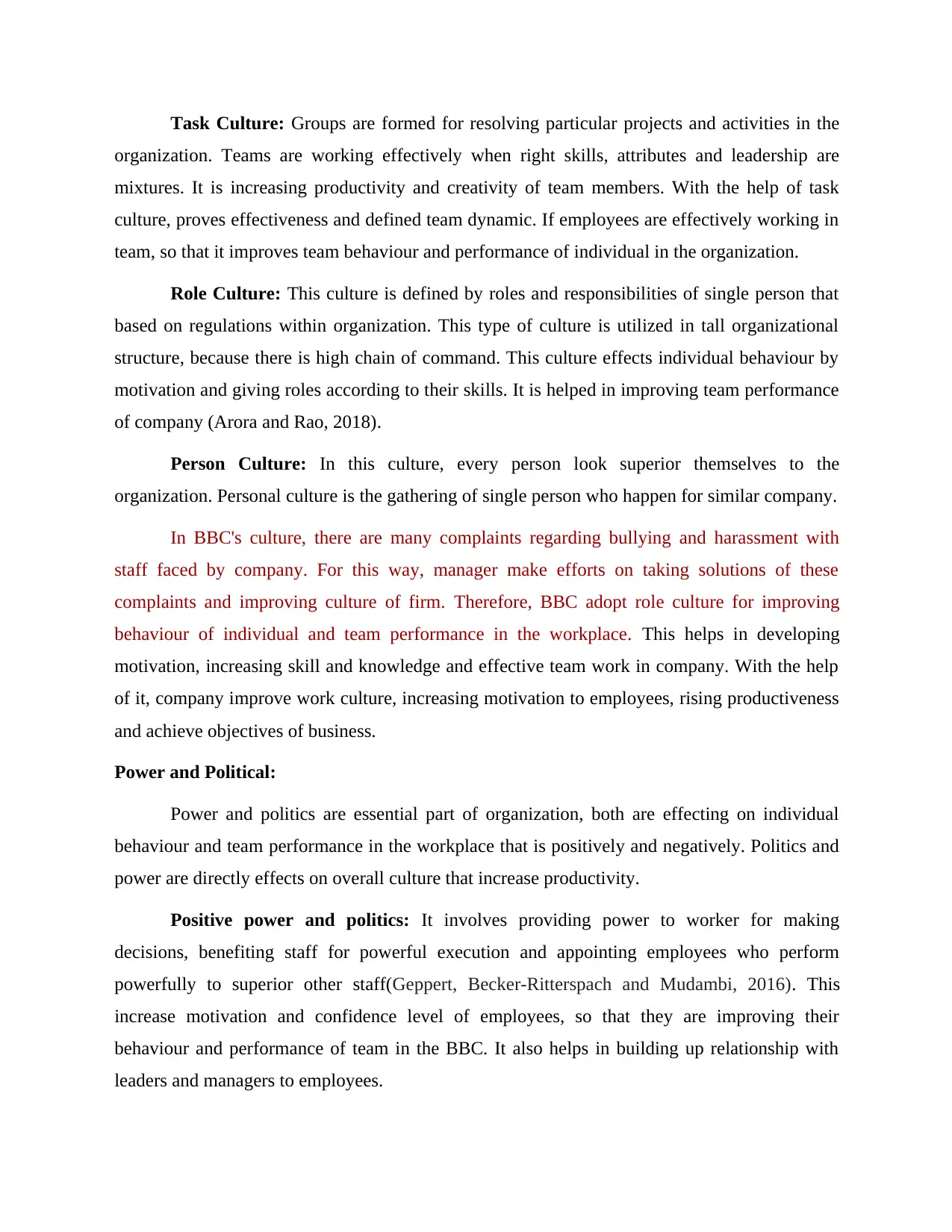
Task Culture: Groups are formed for resolving particular projects and activities in the
organization. Teams are working effectively when right skills, attributes and leadership are
mixtures. It is increasing productivity and creativity of team members. With the help of task
culture, proves effectiveness and defined team dynamic. If employees are effectively working in
team, so that it improves team behaviour and performance of individual in the organization.
Role Culture: This culture is defined by roles and responsibilities of single person that
based on regulations within organization. This type of culture is utilized in tall organizational
structure, because there is high chain of command. This culture effects individual behaviour by
motivation and giving roles according to their skills. It is helped in improving team performance
of company (Arora and Rao, 2018).
Person Culture: In this culture, every person look superior themselves to the
organization. Personal culture is the gathering of single person who happen for similar company.
In BBC's culture, there are many complaints regarding bullying and harassment with
staff faced by company. For this way, manager make efforts on taking solutions of these
complaints and improving culture of firm. Therefore, BBC adopt role culture for improving
behaviour of individual and team performance in the workplace. This helps in developing
motivation, increasing skill and knowledge and effective team work in company. With the help
of it, company improve work culture, increasing motivation to employees, rising productiveness
and achieve objectives of business.
Power and Political:
Power and politics are essential part of organization, both are effecting on individual
behaviour and team performance in the workplace that is positively and negatively. Politics and
power are directly effects on overall culture that increase productivity.
Positive power and politics: It involves providing power to worker for making
decisions, benefiting staff for powerful execution and appointing employees who perform
powerfully to superior other staff(Geppert, Becker-Ritterspach and Mudambi, 2016). This
increase motivation and confidence level of employees, so that they are improving their
behaviour and performance of team in the BBC. It also helps in building up relationship with
leaders and managers to employees.
organization. Teams are working effectively when right skills, attributes and leadership are
mixtures. It is increasing productivity and creativity of team members. With the help of task
culture, proves effectiveness and defined team dynamic. If employees are effectively working in
team, so that it improves team behaviour and performance of individual in the organization.
Role Culture: This culture is defined by roles and responsibilities of single person that
based on regulations within organization. This type of culture is utilized in tall organizational
structure, because there is high chain of command. This culture effects individual behaviour by
motivation and giving roles according to their skills. It is helped in improving team performance
of company (Arora and Rao, 2018).
Person Culture: In this culture, every person look superior themselves to the
organization. Personal culture is the gathering of single person who happen for similar company.
In BBC's culture, there are many complaints regarding bullying and harassment with
staff faced by company. For this way, manager make efforts on taking solutions of these
complaints and improving culture of firm. Therefore, BBC adopt role culture for improving
behaviour of individual and team performance in the workplace. This helps in developing
motivation, increasing skill and knowledge and effective team work in company. With the help
of it, company improve work culture, increasing motivation to employees, rising productiveness
and achieve objectives of business.
Power and Political:
Power and politics are essential part of organization, both are effecting on individual
behaviour and team performance in the workplace that is positively and negatively. Politics and
power are directly effects on overall culture that increase productivity.
Positive power and politics: It involves providing power to worker for making
decisions, benefiting staff for powerful execution and appointing employees who perform
powerfully to superior other staff(Geppert, Becker-Ritterspach and Mudambi, 2016). This
increase motivation and confidence level of employees, so that they are improving their
behaviour and performance of team in the BBC. It also helps in building up relationship with
leaders and managers to employees.
Paraphrase This Document
Need a fresh take? Get an instant paraphrase of this document with our AI Paraphraser
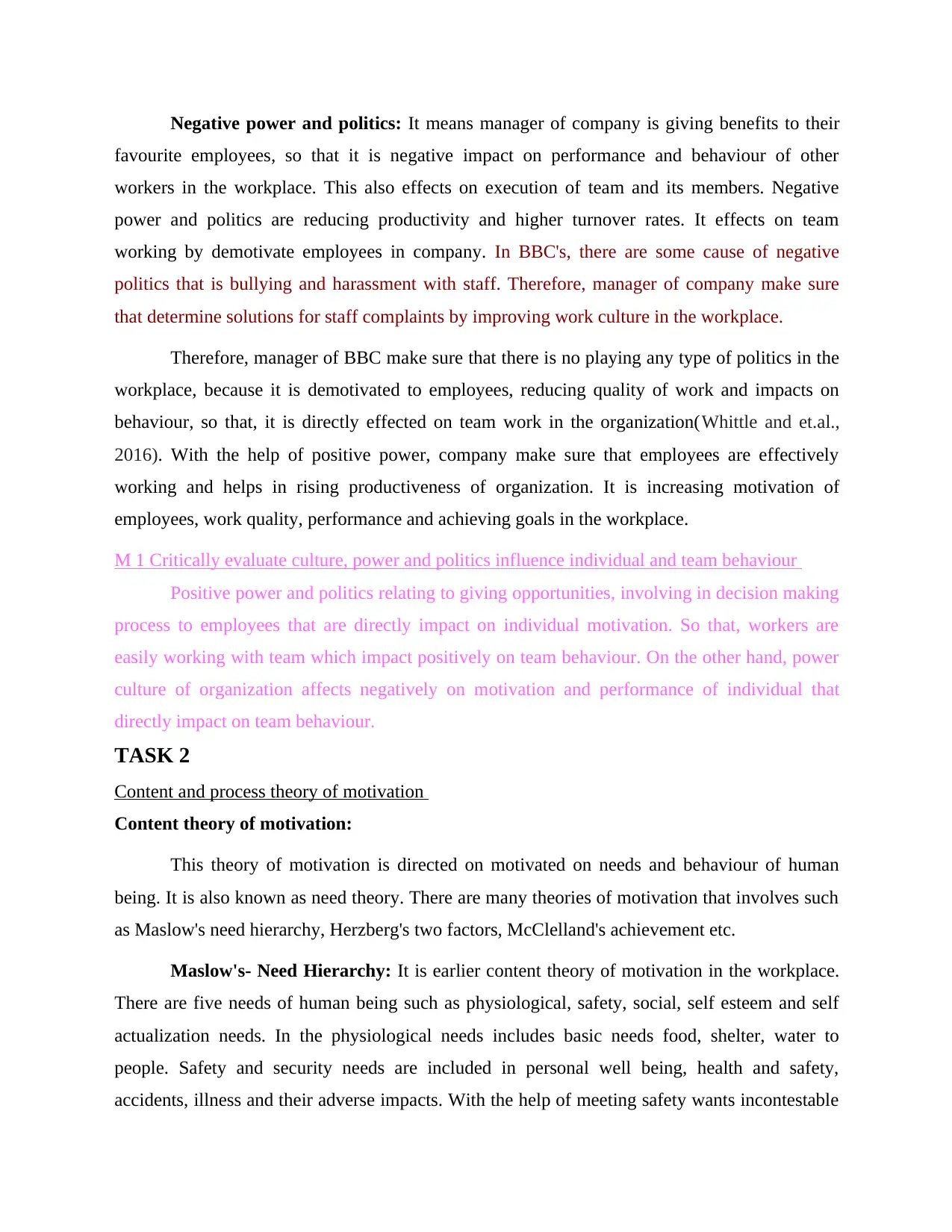
Negative power and politics: It means manager of company is giving benefits to their
favourite employees, so that it is negative impact on performance and behaviour of other
workers in the workplace. This also effects on execution of team and its members. Negative
power and politics are reducing productivity and higher turnover rates. It effects on team
working by demotivate employees in company. In BBC's, there are some cause of negative
politics that is bullying and harassment with staff. Therefore, manager of company make sure
that determine solutions for staff complaints by improving work culture in the workplace.
Therefore, manager of BBC make sure that there is no playing any type of politics in the
workplace, because it is demotivated to employees, reducing quality of work and impacts on
behaviour, so that, it is directly effected on team work in the organization(Whittle and et.al.,
2016). With the help of positive power, company make sure that employees are effectively
working and helps in rising productiveness of organization. It is increasing motivation of
employees, work quality, performance and achieving goals in the workplace.
M 1 Critically evaluate culture, power and politics influence individual and team behaviour
Positive power and politics relating to giving opportunities, involving in decision making
process to employees that are directly impact on individual motivation. So that, workers are
easily working with team which impact positively on team behaviour. On the other hand, power
culture of organization affects negatively on motivation and performance of individual that
directly impact on team behaviour.
TASK 2
Content and process theory of motivation
Content theory of motivation:
This theory of motivation is directed on motivated on needs and behaviour of human
being. It is also known as need theory. There are many theories of motivation that involves such
as Maslow's need hierarchy, Herzberg's two factors, McClelland's achievement etc.
Maslow's- Need Hierarchy: It is earlier content theory of motivation in the workplace.
There are five needs of human being such as physiological, safety, social, self esteem and self
actualization needs. In the physiological needs includes basic needs food, shelter, water to
people. Safety and security needs are included in personal well being, health and safety,
accidents, illness and their adverse impacts. With the help of meeting safety wants incontestable
favourite employees, so that it is negative impact on performance and behaviour of other
workers in the workplace. This also effects on execution of team and its members. Negative
power and politics are reducing productivity and higher turnover rates. It effects on team
working by demotivate employees in company. In BBC's, there are some cause of negative
politics that is bullying and harassment with staff. Therefore, manager of company make sure
that determine solutions for staff complaints by improving work culture in the workplace.
Therefore, manager of BBC make sure that there is no playing any type of politics in the
workplace, because it is demotivated to employees, reducing quality of work and impacts on
behaviour, so that, it is directly effected on team work in the organization(Whittle and et.al.,
2016). With the help of positive power, company make sure that employees are effectively
working and helps in rising productiveness of organization. It is increasing motivation of
employees, work quality, performance and achieving goals in the workplace.
M 1 Critically evaluate culture, power and politics influence individual and team behaviour
Positive power and politics relating to giving opportunities, involving in decision making
process to employees that are directly impact on individual motivation. So that, workers are
easily working with team which impact positively on team behaviour. On the other hand, power
culture of organization affects negatively on motivation and performance of individual that
directly impact on team behaviour.
TASK 2
Content and process theory of motivation
Content theory of motivation:
This theory of motivation is directed on motivated on needs and behaviour of human
being. It is also known as need theory. There are many theories of motivation that involves such
as Maslow's need hierarchy, Herzberg's two factors, McClelland's achievement etc.
Maslow's- Need Hierarchy: It is earlier content theory of motivation in the workplace.
There are five needs of human being such as physiological, safety, social, self esteem and self
actualization needs. In the physiological needs includes basic needs food, shelter, water to
people. Safety and security needs are included in personal well being, health and safety,
accidents, illness and their adverse impacts. With the help of meeting safety wants incontestable
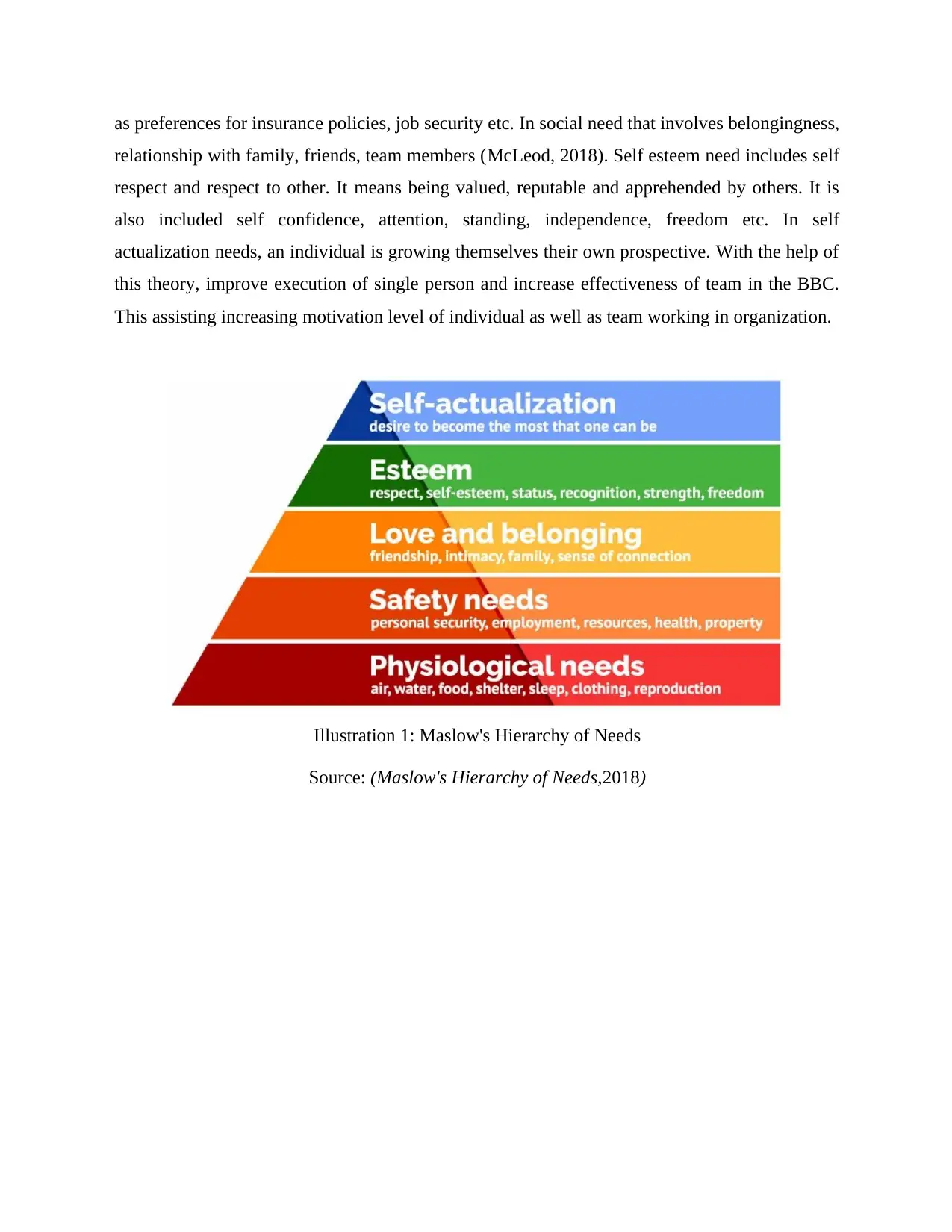
as preferences for insurance policies, job security etc. In social need that involves belongingness,
relationship with family, friends, team members (McLeod, 2018). Self esteem need includes self
respect and respect to other. It means being valued, reputable and apprehended by others. It is
also included self confidence, attention, standing, independence, freedom etc. In self
actualization needs, an individual is growing themselves their own prospective. With the help of
this theory, improve execution of single person and increase effectiveness of team in the BBC.
This assisting increasing motivation level of individual as well as team working in organization.
Illustration 1: Maslow's Hierarchy of Needs
Source: (Maslow's Hierarchy of Needs,2018)
relationship with family, friends, team members (McLeod, 2018). Self esteem need includes self
respect and respect to other. It means being valued, reputable and apprehended by others. It is
also included self confidence, attention, standing, independence, freedom etc. In self
actualization needs, an individual is growing themselves their own prospective. With the help of
this theory, improve execution of single person and increase effectiveness of team in the BBC.
This assisting increasing motivation level of individual as well as team working in organization.
Illustration 1: Maslow's Hierarchy of Needs
Source: (Maslow's Hierarchy of Needs,2018)
⊘ This is a preview!⊘
Do you want full access?
Subscribe today to unlock all pages.

Trusted by 1+ million students worldwide
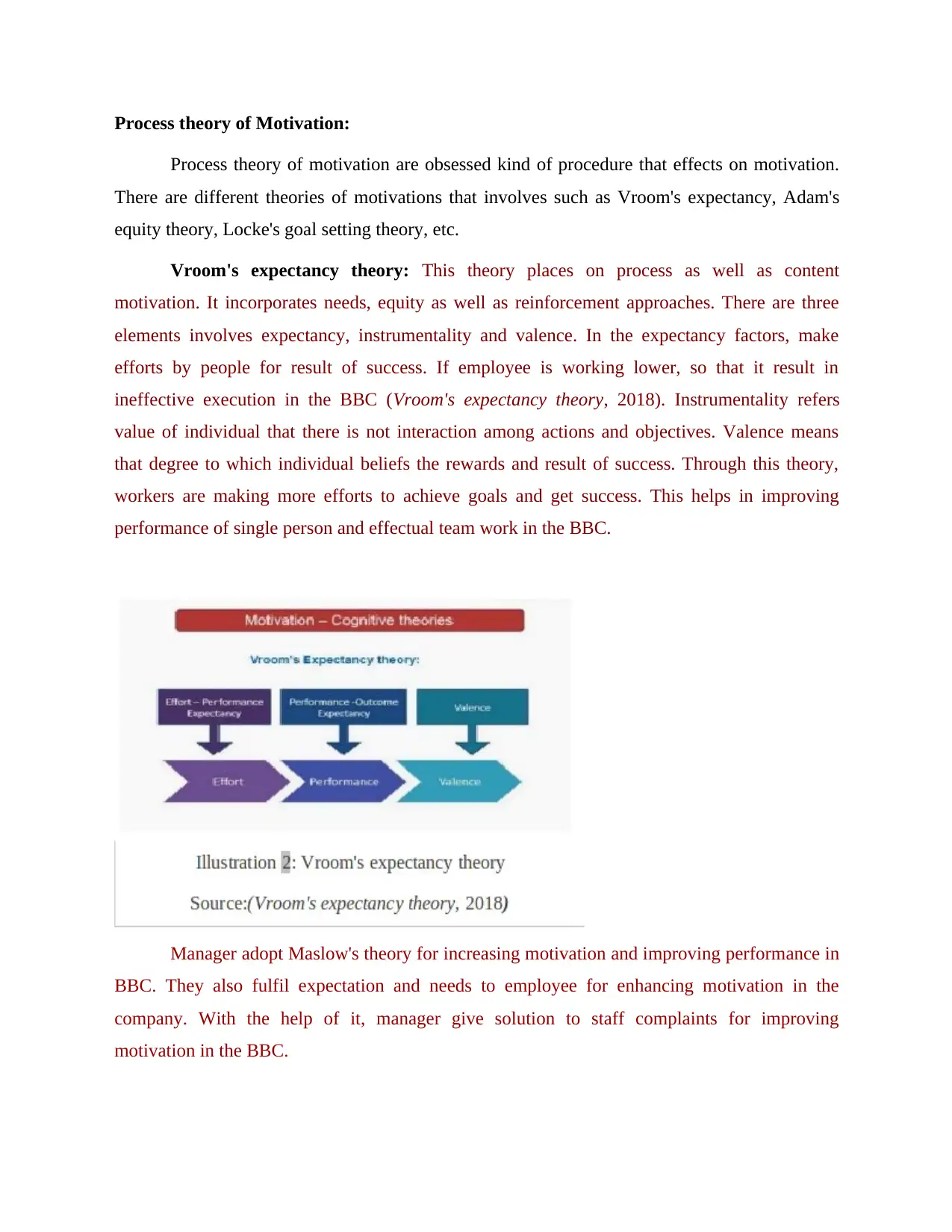
Process theory of Motivation:
Process theory of motivation are obsessed kind of procedure that effects on motivation.
There are different theories of motivations that involves such as Vroom's expectancy, Adam's
equity theory, Locke's goal setting theory, etc.
Vroom's expectancy theory: This theory places on process as well as content
motivation. It incorporates needs, equity as well as reinforcement approaches. There are three
elements involves expectancy, instrumentality and valence. In the expectancy factors, make
efforts by people for result of success. If employee is working lower, so that it result in
ineffective execution in the BBC (Vroom's expectancy theory, 2018). Instrumentality refers
value of individual that there is not interaction among actions and objectives. Valence means
that degree to which individual beliefs the rewards and result of success. Through this theory,
workers are making more efforts to achieve goals and get success. This helps in improving
performance of single person and effectual team work in the BBC.
Manager adopt Maslow's theory for increasing motivation and improving performance in
BBC. They also fulfil expectation and needs to employee for enhancing motivation in the
company. With the help of it, manager give solution to staff complaints for improving
motivation in the BBC.
Process theory of motivation are obsessed kind of procedure that effects on motivation.
There are different theories of motivations that involves such as Vroom's expectancy, Adam's
equity theory, Locke's goal setting theory, etc.
Vroom's expectancy theory: This theory places on process as well as content
motivation. It incorporates needs, equity as well as reinforcement approaches. There are three
elements involves expectancy, instrumentality and valence. In the expectancy factors, make
efforts by people for result of success. If employee is working lower, so that it result in
ineffective execution in the BBC (Vroom's expectancy theory, 2018). Instrumentality refers
value of individual that there is not interaction among actions and objectives. Valence means
that degree to which individual beliefs the rewards and result of success. Through this theory,
workers are making more efforts to achieve goals and get success. This helps in improving
performance of single person and effectual team work in the BBC.
Manager adopt Maslow's theory for increasing motivation and improving performance in
BBC. They also fulfil expectation and needs to employee for enhancing motivation in the
company. With the help of it, manager give solution to staff complaints for improving
motivation in the BBC.
Paraphrase This Document
Need a fresh take? Get an instant paraphrase of this document with our AI Paraphraser
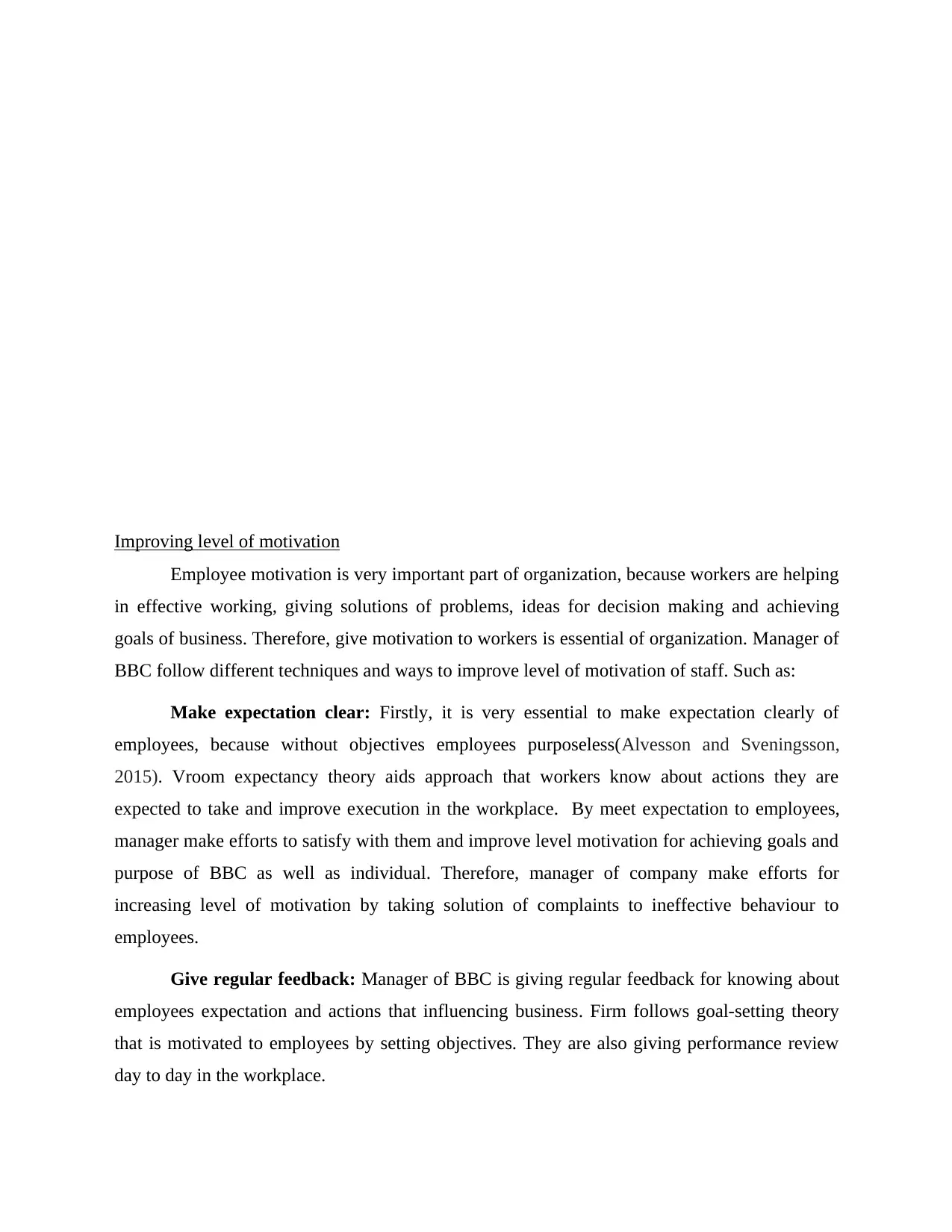
Improving level of motivation
Employee motivation is very important part of organization, because workers are helping
in effective working, giving solutions of problems, ideas for decision making and achieving
goals of business. Therefore, give motivation to workers is essential of organization. Manager of
BBC follow different techniques and ways to improve level of motivation of staff. Such as:
Make expectation clear: Firstly, it is very essential to make expectation clearly of
employees, because without objectives employees purposeless(Alvesson and Sveningsson,
2015). Vroom expectancy theory aids approach that workers know about actions they are
expected to take and improve execution in the workplace. By meet expectation to employees,
manager make efforts to satisfy with them and improve level motivation for achieving goals and
purpose of BBC as well as individual. Therefore, manager of company make efforts for
increasing level of motivation by taking solution of complaints to ineffective behaviour to
employees.
Give regular feedback: Manager of BBC is giving regular feedback for knowing about
employees expectation and actions that influencing business. Firm follows goal-setting theory
that is motivated to employees by setting objectives. They are also giving performance review
day to day in the workplace.
Employee motivation is very important part of organization, because workers are helping
in effective working, giving solutions of problems, ideas for decision making and achieving
goals of business. Therefore, give motivation to workers is essential of organization. Manager of
BBC follow different techniques and ways to improve level of motivation of staff. Such as:
Make expectation clear: Firstly, it is very essential to make expectation clearly of
employees, because without objectives employees purposeless(Alvesson and Sveningsson,
2015). Vroom expectancy theory aids approach that workers know about actions they are
expected to take and improve execution in the workplace. By meet expectation to employees,
manager make efforts to satisfy with them and improve level motivation for achieving goals and
purpose of BBC as well as individual. Therefore, manager of company make efforts for
increasing level of motivation by taking solution of complaints to ineffective behaviour to
employees.
Give regular feedback: Manager of BBC is giving regular feedback for knowing about
employees expectation and actions that influencing business. Firm follows goal-setting theory
that is motivated to employees by setting objectives. They are also giving performance review
day to day in the workplace.
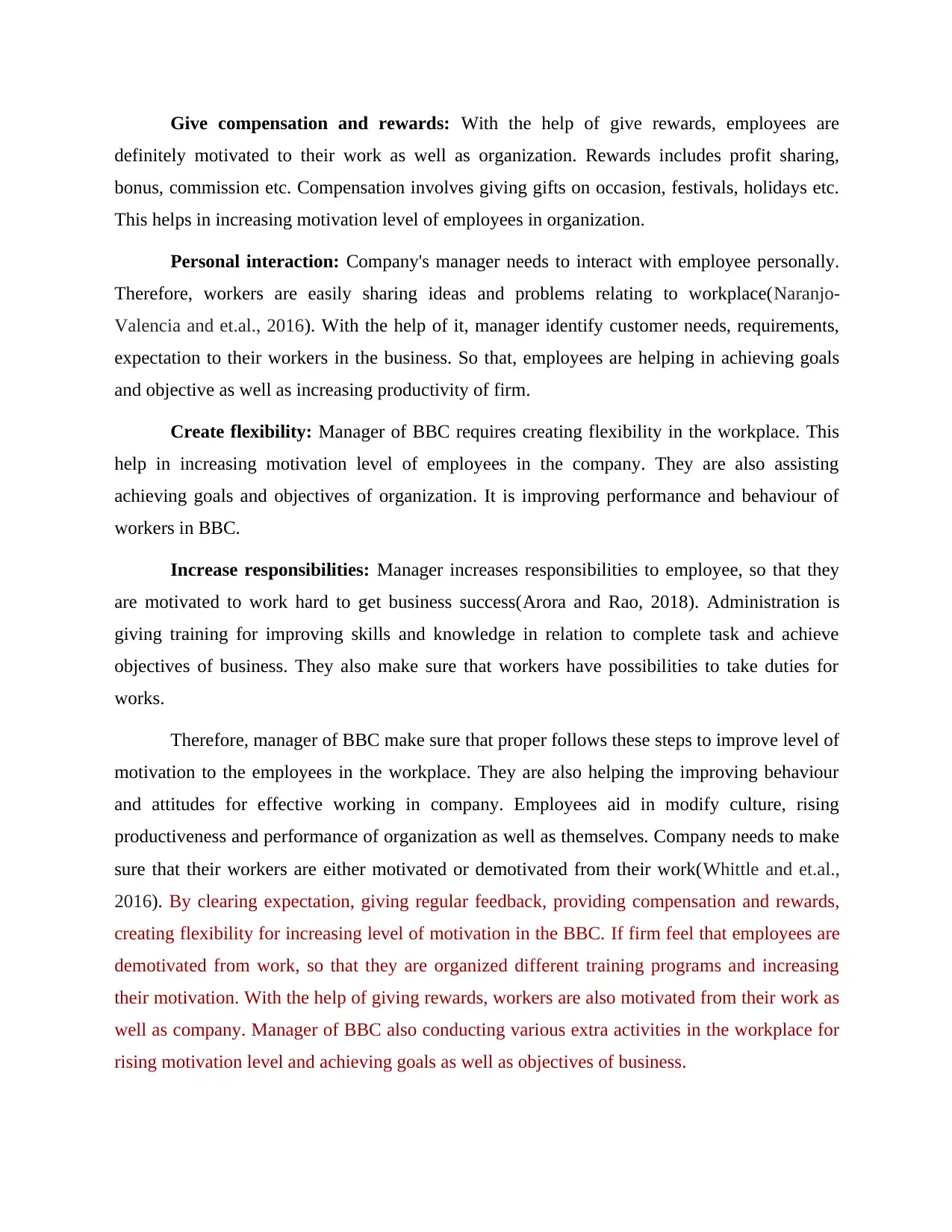
Give compensation and rewards: With the help of give rewards, employees are
definitely motivated to their work as well as organization. Rewards includes profit sharing,
bonus, commission etc. Compensation involves giving gifts on occasion, festivals, holidays etc.
This helps in increasing motivation level of employees in organization.
Personal interaction: Company's manager needs to interact with employee personally.
Therefore, workers are easily sharing ideas and problems relating to workplace(Naranjo-
Valencia and et.al., 2016). With the help of it, manager identify customer needs, requirements,
expectation to their workers in the business. So that, employees are helping in achieving goals
and objective as well as increasing productivity of firm.
Create flexibility: Manager of BBC requires creating flexibility in the workplace. This
help in increasing motivation level of employees in the company. They are also assisting
achieving goals and objectives of organization. It is improving performance and behaviour of
workers in BBC.
Increase responsibilities: Manager increases responsibilities to employee, so that they
are motivated to work hard to get business success(Arora and Rao, 2018). Administration is
giving training for improving skills and knowledge in relation to complete task and achieve
objectives of business. They also make sure that workers have possibilities to take duties for
works.
Therefore, manager of BBC make sure that proper follows these steps to improve level of
motivation to the employees in the workplace. They are also helping the improving behaviour
and attitudes for effective working in company. Employees aid in modify culture, rising
productiveness and performance of organization as well as themselves. Company needs to make
sure that their workers are either motivated or demotivated from their work(Whittle and et.al.,
2016). By clearing expectation, giving regular feedback, providing compensation and rewards,
creating flexibility for increasing level of motivation in the BBC. If firm feel that employees are
demotivated from work, so that they are organized different training programs and increasing
their motivation. With the help of giving rewards, workers are also motivated from their work as
well as company. Manager of BBC also conducting various extra activities in the workplace for
rising motivation level and achieving goals as well as objectives of business.
definitely motivated to their work as well as organization. Rewards includes profit sharing,
bonus, commission etc. Compensation involves giving gifts on occasion, festivals, holidays etc.
This helps in increasing motivation level of employees in organization.
Personal interaction: Company's manager needs to interact with employee personally.
Therefore, workers are easily sharing ideas and problems relating to workplace(Naranjo-
Valencia and et.al., 2016). With the help of it, manager identify customer needs, requirements,
expectation to their workers in the business. So that, employees are helping in achieving goals
and objective as well as increasing productivity of firm.
Create flexibility: Manager of BBC requires creating flexibility in the workplace. This
help in increasing motivation level of employees in the company. They are also assisting
achieving goals and objectives of organization. It is improving performance and behaviour of
workers in BBC.
Increase responsibilities: Manager increases responsibilities to employee, so that they
are motivated to work hard to get business success(Arora and Rao, 2018). Administration is
giving training for improving skills and knowledge in relation to complete task and achieve
objectives of business. They also make sure that workers have possibilities to take duties for
works.
Therefore, manager of BBC make sure that proper follows these steps to improve level of
motivation to the employees in the workplace. They are also helping the improving behaviour
and attitudes for effective working in company. Employees aid in modify culture, rising
productiveness and performance of organization as well as themselves. Company needs to make
sure that their workers are either motivated or demotivated from their work(Whittle and et.al.,
2016). By clearing expectation, giving regular feedback, providing compensation and rewards,
creating flexibility for increasing level of motivation in the BBC. If firm feel that employees are
demotivated from work, so that they are organized different training programs and increasing
their motivation. With the help of giving rewards, workers are also motivated from their work as
well as company. Manager of BBC also conducting various extra activities in the workplace for
rising motivation level and achieving goals as well as objectives of business.
⊘ This is a preview!⊘
Do you want full access?
Subscribe today to unlock all pages.

Trusted by 1+ million students worldwide
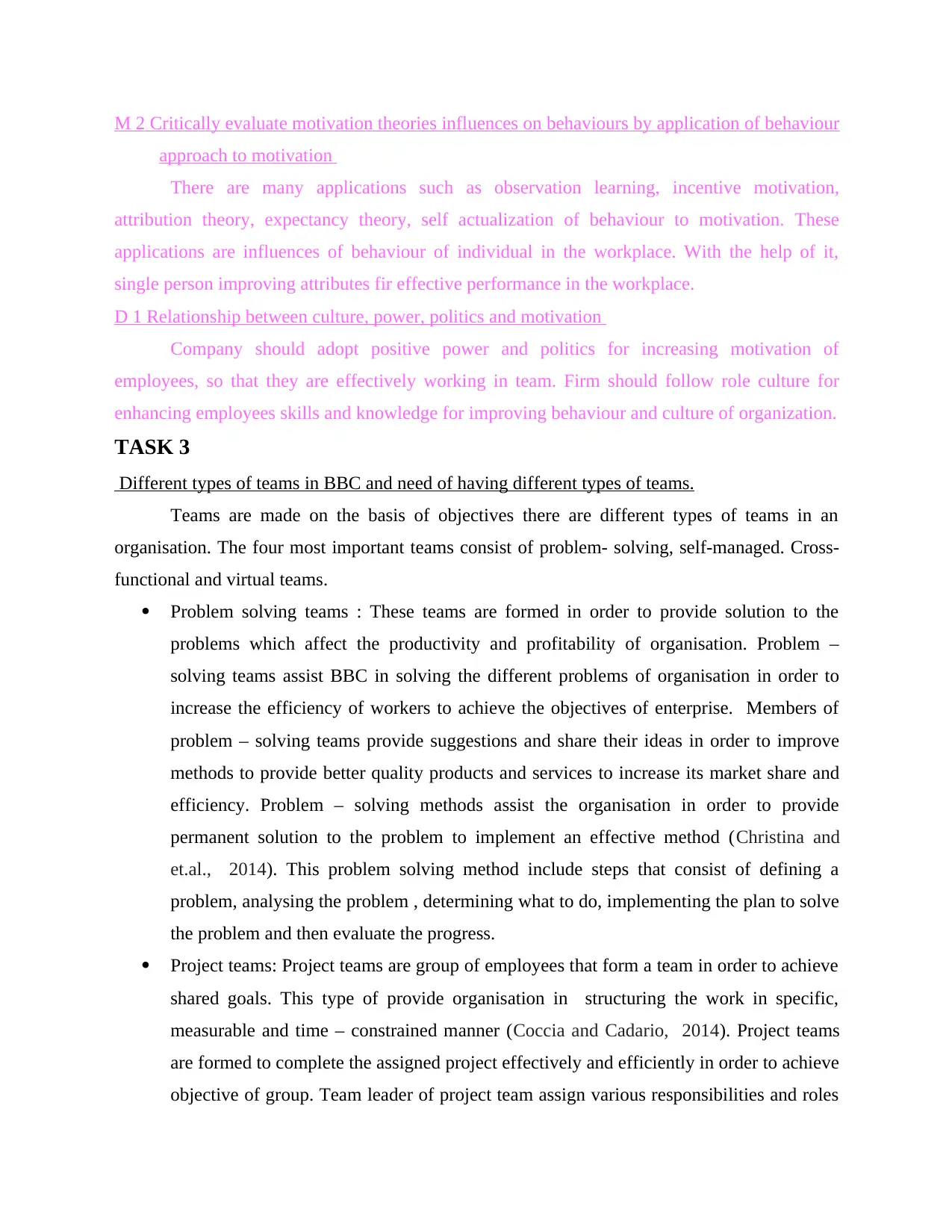
M 2 Critically evaluate motivation theories influences on behaviours by application of behaviour
approach to motivation
There are many applications such as observation learning, incentive motivation,
attribution theory, expectancy theory, self actualization of behaviour to motivation. These
applications are influences of behaviour of individual in the workplace. With the help of it,
single person improving attributes fir effective performance in the workplace.
D 1 Relationship between culture, power, politics and motivation
Company should adopt positive power and politics for increasing motivation of
employees, so that they are effectively working in team. Firm should follow role culture for
enhancing employees skills and knowledge for improving behaviour and culture of organization.
TASK 3
Different types of teams in BBC and need of having different types of teams.
Teams are made on the basis of objectives there are different types of teams in an
organisation. The four most important teams consist of problem- solving, self-managed. Cross-
functional and virtual teams.
Problem solving teams : These teams are formed in order to provide solution to the
problems which affect the productivity and profitability of organisation. Problem –
solving teams assist BBC in solving the different problems of organisation in order to
increase the efficiency of workers to achieve the objectives of enterprise. Members of
problem – solving teams provide suggestions and share their ideas in order to improve
methods to provide better quality products and services to increase its market share and
efficiency. Problem – solving methods assist the organisation in order to provide
permanent solution to the problem to implement an effective method (Christina and
et.al., 2014). This problem solving method include steps that consist of defining a
problem, analysing the problem , determining what to do, implementing the plan to solve
the problem and then evaluate the progress.
Project teams: Project teams are group of employees that form a team in order to achieve
shared goals. This type of provide organisation in structuring the work in specific,
measurable and time – constrained manner (Coccia and Cadario, 2014). Project teams
are formed to complete the assigned project effectively and efficiently in order to achieve
objective of group. Team leader of project team assign various responsibilities and roles
approach to motivation
There are many applications such as observation learning, incentive motivation,
attribution theory, expectancy theory, self actualization of behaviour to motivation. These
applications are influences of behaviour of individual in the workplace. With the help of it,
single person improving attributes fir effective performance in the workplace.
D 1 Relationship between culture, power, politics and motivation
Company should adopt positive power and politics for increasing motivation of
employees, so that they are effectively working in team. Firm should follow role culture for
enhancing employees skills and knowledge for improving behaviour and culture of organization.
TASK 3
Different types of teams in BBC and need of having different types of teams.
Teams are made on the basis of objectives there are different types of teams in an
organisation. The four most important teams consist of problem- solving, self-managed. Cross-
functional and virtual teams.
Problem solving teams : These teams are formed in order to provide solution to the
problems which affect the productivity and profitability of organisation. Problem –
solving teams assist BBC in solving the different problems of organisation in order to
increase the efficiency of workers to achieve the objectives of enterprise. Members of
problem – solving teams provide suggestions and share their ideas in order to improve
methods to provide better quality products and services to increase its market share and
efficiency. Problem – solving methods assist the organisation in order to provide
permanent solution to the problem to implement an effective method (Christina and
et.al., 2014). This problem solving method include steps that consist of defining a
problem, analysing the problem , determining what to do, implementing the plan to solve
the problem and then evaluate the progress.
Project teams: Project teams are group of employees that form a team in order to achieve
shared goals. This type of provide organisation in structuring the work in specific,
measurable and time – constrained manner (Coccia and Cadario, 2014). Project teams
are formed to complete the assigned project effectively and efficiently in order to achieve
objective of group. Team leader of project team assign various responsibilities and roles
Paraphrase This Document
Need a fresh take? Get an instant paraphrase of this document with our AI Paraphraser
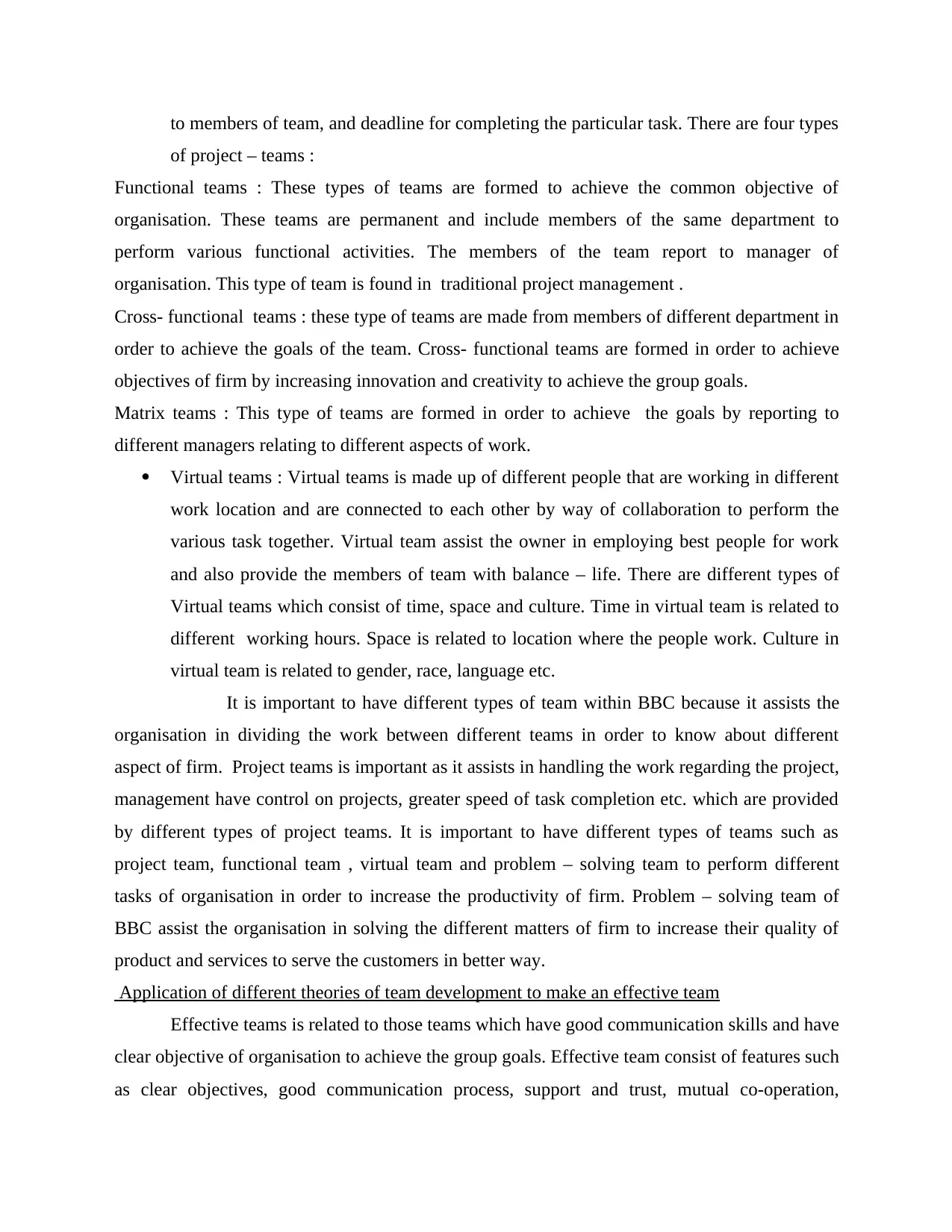
to members of team, and deadline for completing the particular task. There are four types
of project – teams :
Functional teams : These types of teams are formed to achieve the common objective of
organisation. These teams are permanent and include members of the same department to
perform various functional activities. The members of the team report to manager of
organisation. This type of team is found in traditional project management .
Cross- functional teams : these type of teams are made from members of different department in
order to achieve the goals of the team. Cross- functional teams are formed in order to achieve
objectives of firm by increasing innovation and creativity to achieve the group goals.
Matrix teams : This type of teams are formed in order to achieve the goals by reporting to
different managers relating to different aspects of work.
Virtual teams : Virtual teams is made up of different people that are working in different
work location and are connected to each other by way of collaboration to perform the
various task together. Virtual team assist the owner in employing best people for work
and also provide the members of team with balance – life. There are different types of
Virtual teams which consist of time, space and culture. Time in virtual team is related to
different working hours. Space is related to location where the people work. Culture in
virtual team is related to gender, race, language etc.
It is important to have different types of team within BBC because it assists the
organisation in dividing the work between different teams in order to know about different
aspect of firm. Project teams is important as it assists in handling the work regarding the project,
management have control on projects, greater speed of task completion etc. which are provided
by different types of project teams. It is important to have different types of teams such as
project team, functional team , virtual team and problem – solving team to perform different
tasks of organisation in order to increase the productivity of firm. Problem – solving team of
BBC assist the organisation in solving the different matters of firm to increase their quality of
product and services to serve the customers in better way.
Application of different theories of team development to make an effective team
Effective teams is related to those teams which have good communication skills and have
clear objective of organisation to achieve the group goals. Effective team consist of features such
as clear objectives, good communication process, support and trust, mutual co-operation,
of project – teams :
Functional teams : These types of teams are formed to achieve the common objective of
organisation. These teams are permanent and include members of the same department to
perform various functional activities. The members of the team report to manager of
organisation. This type of team is found in traditional project management .
Cross- functional teams : these type of teams are made from members of different department in
order to achieve the goals of the team. Cross- functional teams are formed in order to achieve
objectives of firm by increasing innovation and creativity to achieve the group goals.
Matrix teams : This type of teams are formed in order to achieve the goals by reporting to
different managers relating to different aspects of work.
Virtual teams : Virtual teams is made up of different people that are working in different
work location and are connected to each other by way of collaboration to perform the
various task together. Virtual team assist the owner in employing best people for work
and also provide the members of team with balance – life. There are different types of
Virtual teams which consist of time, space and culture. Time in virtual team is related to
different working hours. Space is related to location where the people work. Culture in
virtual team is related to gender, race, language etc.
It is important to have different types of team within BBC because it assists the
organisation in dividing the work between different teams in order to know about different
aspect of firm. Project teams is important as it assists in handling the work regarding the project,
management have control on projects, greater speed of task completion etc. which are provided
by different types of project teams. It is important to have different types of teams such as
project team, functional team , virtual team and problem – solving team to perform different
tasks of organisation in order to increase the productivity of firm. Problem – solving team of
BBC assist the organisation in solving the different matters of firm to increase their quality of
product and services to serve the customers in better way.
Application of different theories of team development to make an effective team
Effective teams is related to those teams which have good communication skills and have
clear objective of organisation to achieve the group goals. Effective team consist of features such
as clear objectives, good communication process, support and trust, mutual co-operation,
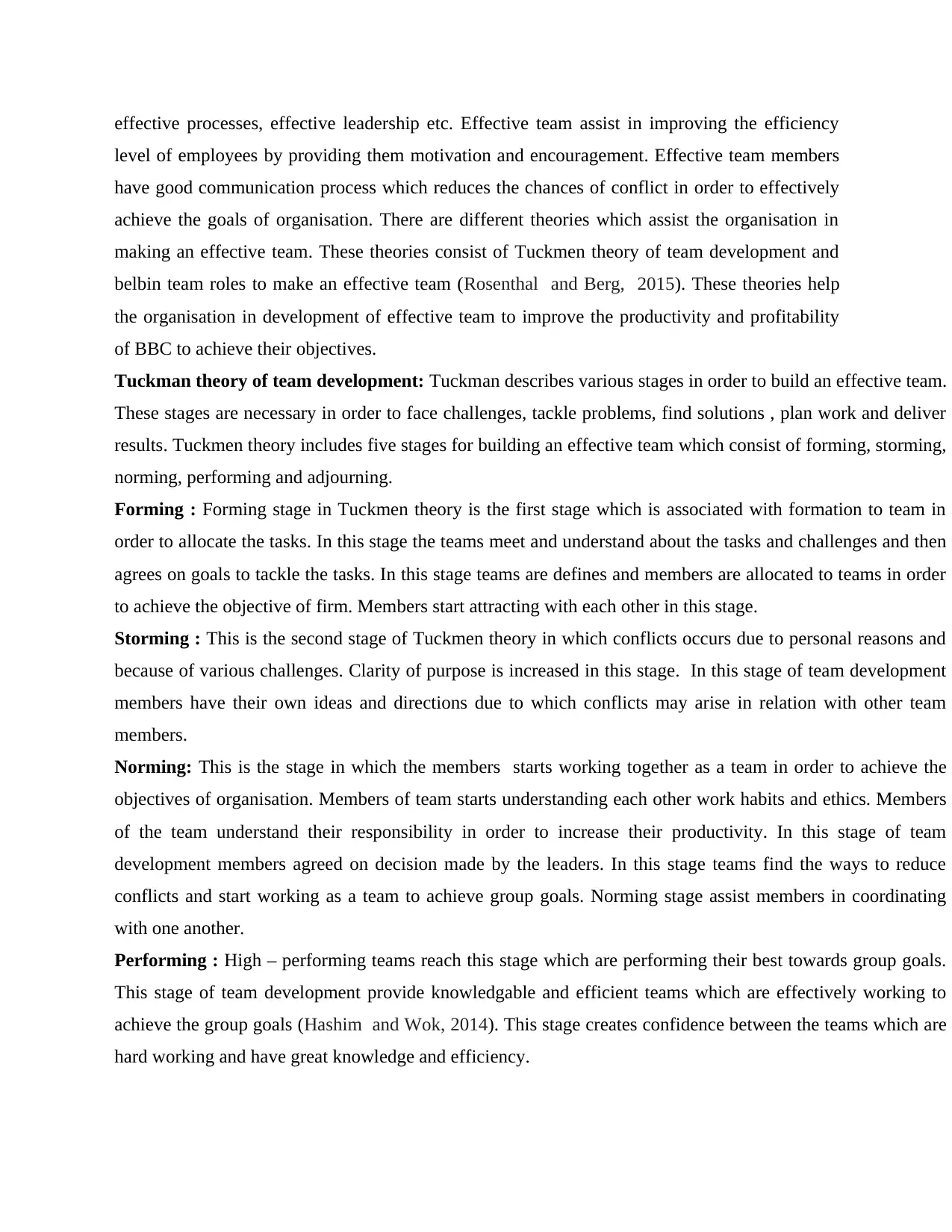
effective processes, effective leadership etc. Effective team assist in improving the efficiency
level of employees by providing them motivation and encouragement. Effective team members
have good communication process which reduces the chances of conflict in order to effectively
achieve the goals of organisation. There are different theories which assist the organisation in
making an effective team. These theories consist of Tuckmen theory of team development and
belbin team roles to make an effective team (Rosenthal and Berg, 2015). These theories help
the organisation in development of effective team to improve the productivity and profitability
of BBC to achieve their objectives.
Tuckman theory of team development: Tuckman describes various stages in order to build an effective team.
These stages are necessary in order to face challenges, tackle problems, find solutions , plan work and deliver
results. Tuckmen theory includes five stages for building an effective team which consist of forming, storming,
norming, performing and adjourning.
Forming : Forming stage in Tuckmen theory is the first stage which is associated with formation to team in
order to allocate the tasks. In this stage the teams meet and understand about the tasks and challenges and then
agrees on goals to tackle the tasks. In this stage teams are defines and members are allocated to teams in order
to achieve the objective of firm. Members start attracting with each other in this stage.
Storming : This is the second stage of Tuckmen theory in which conflicts occurs due to personal reasons and
because of various challenges. Clarity of purpose is increased in this stage. In this stage of team development
members have their own ideas and directions due to which conflicts may arise in relation with other team
members.
Norming: This is the stage in which the members starts working together as a team in order to achieve the
objectives of organisation. Members of team starts understanding each other work habits and ethics. Members
of the team understand their responsibility in order to increase their productivity. In this stage of team
development members agreed on decision made by the leaders. In this stage teams find the ways to reduce
conflicts and start working as a team to achieve group goals. Norming stage assist members in coordinating
with one another.
Performing : High – performing teams reach this stage which are performing their best towards group goals.
This stage of team development provide knowledgable and efficient teams which are effectively working to
achieve the group goals (Hashim and Wok, 2014). This stage creates confidence between the teams which are
hard working and have great knowledge and efficiency.
level of employees by providing them motivation and encouragement. Effective team members
have good communication process which reduces the chances of conflict in order to effectively
achieve the goals of organisation. There are different theories which assist the organisation in
making an effective team. These theories consist of Tuckmen theory of team development and
belbin team roles to make an effective team (Rosenthal and Berg, 2015). These theories help
the organisation in development of effective team to improve the productivity and profitability
of BBC to achieve their objectives.
Tuckman theory of team development: Tuckman describes various stages in order to build an effective team.
These stages are necessary in order to face challenges, tackle problems, find solutions , plan work and deliver
results. Tuckmen theory includes five stages for building an effective team which consist of forming, storming,
norming, performing and adjourning.
Forming : Forming stage in Tuckmen theory is the first stage which is associated with formation to team in
order to allocate the tasks. In this stage the teams meet and understand about the tasks and challenges and then
agrees on goals to tackle the tasks. In this stage teams are defines and members are allocated to teams in order
to achieve the objective of firm. Members start attracting with each other in this stage.
Storming : This is the second stage of Tuckmen theory in which conflicts occurs due to personal reasons and
because of various challenges. Clarity of purpose is increased in this stage. In this stage of team development
members have their own ideas and directions due to which conflicts may arise in relation with other team
members.
Norming: This is the stage in which the members starts working together as a team in order to achieve the
objectives of organisation. Members of team starts understanding each other work habits and ethics. Members
of the team understand their responsibility in order to increase their productivity. In this stage of team
development members agreed on decision made by the leaders. In this stage teams find the ways to reduce
conflicts and start working as a team to achieve group goals. Norming stage assist members in coordinating
with one another.
Performing : High – performing teams reach this stage which are performing their best towards group goals.
This stage of team development provide knowledgable and efficient teams which are effectively working to
achieve the group goals (Hashim and Wok, 2014). This stage creates confidence between the teams which are
hard working and have great knowledge and efficiency.
⊘ This is a preview!⊘
Do you want full access?
Subscribe today to unlock all pages.

Trusted by 1+ million students worldwide
1 out of 19
Related Documents
Your All-in-One AI-Powered Toolkit for Academic Success.
+13062052269
info@desklib.com
Available 24*7 on WhatsApp / Email
![[object Object]](/_next/static/media/star-bottom.7253800d.svg)
Unlock your academic potential
Copyright © 2020–2026 A2Z Services. All Rights Reserved. Developed and managed by ZUCOL.





